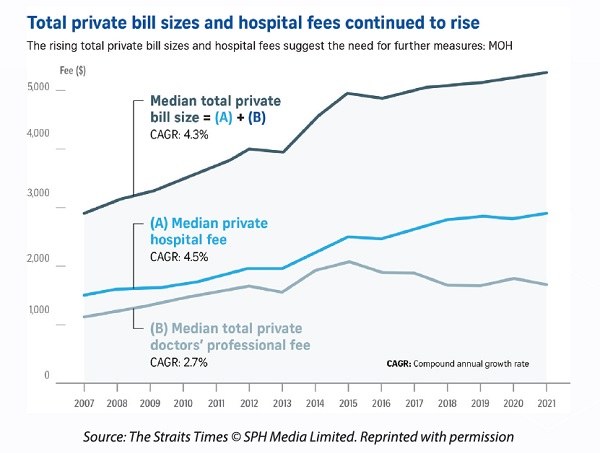There have been recent concerns about the rising cost of private healthcare, and many solutions have been proposed to help manage it. Such concerns are justified, but a holistic approach is needed to tackle the issue of ivate healthcare costs.
It has been suggested that the "as charged" coverage for Integrated Shield Plans (IPs), where MediSave funds are used, should be removed to manage healthcare costs and avoid a "buffet syndrome" of over-consumption.1 In fact, the Health Insurance Task Force had already recognised the risk of "buffet syndrome" in 2016 and made recommendations to address it. As such, all new IPs since 2018 are required to have co-pay and/or deductible features, and full riders that cover the whole hospital bill are no longer allowed. Many IP riders also have claims-based pricing whereby premiums increase when policyholders make claims. Together, these measures introduce an element of shared responsibility and mitigate the problem of over-consumption.
Would controlling private doctors' fees solve the problem? Data released by the Ministry of Health (MOH) in 2023 showed that the median total private doctors' professional fees had already stabilised, and also that the higher fees had fallen.2 This was due to the implementation of measures such as the MOH Fee Benchmarks, fixed fees for IP panel specialists, and routine scrutiny of clinical indications and claims by insurers and MOH.
Should healthcare costs be controlled by further changes in IP design? Such changes must be considered very carefully as they would affect existing policyholders. In the event that policy- holders are dissatisfied with the change to their existing policies, they may not be able to switch insurers because of their pre-existing conditions which inhibits them from taking up a new plan. If further changes in IP design are really required, these changes should only apply to new policyholders or existing policyholders who wish to switch.
So, can we manage private healthcare costs better? The data released by MOH in 2023 showed that the rise in median private hospital facility fees continued unabated between 2007 and 2021.2 Since private hospital facility fees take up a significant proportion of the total hospital bill, an obvious approach to managing private healthcare costs would be to ensure that these fees are kept reasonable. Another approach would be to keep IP premiums reasonable through medical loss ratio regulation (ie, by requiring insurers to spend above a certain percentage of premiums on claims).3
Managing private healthcarecostsis important, and all stakeholders, not just doctors, should play their part.
